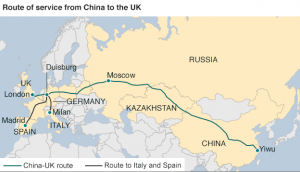The China-London Freight Rail Connection – A Bit of Silk Road PR
The recent arrival of a Chinese freight train that had travelled from Yiwu, a consumer electronics manufacturing hub in Zhejiang province, to London’s Barking station has had many China commentators expressing opinions suggesting this is about to become a regular service and will compete favorably with shipping. Brexit watchers expecting renewed UK-China trade agreements seem confident that this heralds a new dawn of Chinese trains travelling west to meet British consumer demand.
The journey took three days shy of three weeks, covered 8,000 miles, and traversed Kazakhstan, Russia, Belarus, Poland, Germany, Belgium, and France over the course of its 18-day trip, before entering the UK through the Channel Tunnel. The 34 containers were packed with clothes, shoes, suitcases, and other Chinese goods, mainly cheap electronics.
It wasn’t entirely glamorous in either departure or arrival, and certainly not on board. Yiwu city operates purely on the basis of producing cheap products, with kilometer after kilometer of factories churning out low-priced products, mainly electrical, for export overseas. No one visits Yiwu for a holiday. Meanwhile, Barking station is the home of the Eurohub Freight Terminal. The ever pragmatic Chinese want to get straight to the point, and the Orient Express is not seen as a competitor any time soon. Even Paddington Bear managed to arrive at a station with a somewhat grander opulence , and he’d travelled from Peru.

Gripes aside, what does the arrival of the “First Yiwu-London Train” actually mean? Well in reality, not a lot. It is not a regular service, and at present there are no plans to repeat it, and the strange titling of the route gives the game away. Yiwu is hardly well known in the alleyways of darkest Barking, even though the leader of Barking and Dagenham Council did manage to state “It’s a sign of Barking and Dagenham being at the epicenter of the capital’s eastward shift. You could say it’s the rising east meets the Far East.” I bet there were celebrations and fireworks in Yiwu at that remark.
The train journey was in fact a one-off, and was largely paid for by Yiwu Timex Industrial Investment, a logistics company that is heavily involved in the promotion of cross-border trade between Yiwu and foreign countries and has recently diversified into rail. As such, its involvement in OBOR routes makes a lot of sense, and is why the “Yiwu” name, rather than “China” was labelled so prominently.
The train was operated by the Swiss based Inter Rail Group with Japan’s OTT Logistics as the booking agent. In fact, there wasn’t any real British involvement, despite the fanfare.
The main point of the exercise, rather like Edmund Hillary’s climbing of Everest, was to demonstrate that it could be done. That is indeed a remarkable thing. However, there are serious difficulties along the route that impede upon delivery schedules, sustainability, and cost savings. Due to different gauge tracks in use between China, Central Asia, and Europe, the train had to transfer cargo three times, a laborious and time consuming exercise. This means that it wasn’t really “the train” that traveled from China to the UK. Chinese trains use a 4 feet 8 1⁄2 inch gauge (in track width) as a standard. Kazakhstan has a gauge width of 4 feet 11 27⁄32 inch. This means that in reality, it was only the containers that made the entire journey.
Another issue is that China Rail is one of the most congested networks in the world. Just booking space is difficult. That might be fine if most of the cargo would be travelling from China to the UK, but it will also mean leaving significant assets in place, such as available rolling stock at various border points. While it is possible to arrange a one-off trip, getting all the administration in place to support a regular, sustainable service will be quite another.
Still, there are signs that the journey, if logistics problems can be smoothed out, may have some long term benefits. The journey time has been calculated as being half of that achievable by shipping, and with a lower carbon footprint. At the end of the day, it will be identifiable cost savings over shipping that will be the final judge, notwithstanding the significant investment needed to get the service fully operational.
The main beneficiary, however, may be Yiwu Timex Industrial Investment. They have been the movers in getting the Yiwu-London route operational. With close ties to China Rail, the company has also been able to demonstrate the capability of other China-European routes, such as the Yiwu-Madrid service. Getting awareness into the feasibility of Timex’s operations, and publicity about them is a major coup for a company who may later wish to list in Hong Kong or London. But if they do, they need to make sure the services are real and not just publicity stunts arranged to “show it can be done”.
About Us
Silk Road Briefing is published by Asia Briefing, a subsidiary of Dezan Shira & Associates. We produce material for foreign investors throughout Eurasia, including ASEAN, China, India, Indonesia, Russia & Vietnam. For editorial matters please contact us here and for a complimentary subscription to our products, please click here.
Dezan Shira & Associates provide business intelligence, due diligence, legal, tax and advisory services throughout the Asian and Eurasian region. We maintain offices throughout China, South-East Asia, India and Russia. For assistance with OBOR issues or investments into any of the featured countries, please contact us at silkroad@dezshira.com or visit us at www.dezshira.com
Related Reading:
Silk Road and OBOR Business Intelligence
Dezan Shira & Associates´ Silk Road and OBOR investment brochure offers an introduction to the region and an overview of the services provided by the firm. It is Dezan Shira´s mission to guide investors through the Silk Road´s complex regulatory environment and assist with all aspects of establishing, maintaining and growing business operations in the region.
China’s New Economic Silk Road
This unique and currently only available study into the proposed Silk Road Economic Belt examines the institutional, financial and infrastructure projects that are currently underway and in the planning stage across the entire region. Covering over 60 countries, this book explores the regional reforms, potential problems, opportunities and longer term impact that the Silk Road will have upon Asia, Africa, the Middle East, Europe and the United States.








